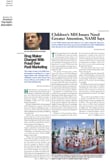Neither the mercury-based vaccine preservative thimerosal nor the measles-mumps-rubella (MMR) vaccine are associated with autism, according to a report from the Institute of Medicine (IOM) of the National Academies.
The IOM committee that wrote the report concluded that hypotheses regarding how the MMR vaccine and thimerosal could trigger autism lack supporting evidence and are theoretical only. Further research to find the cause of autism should be directed toward other lines of inquiry that are supported by current knowledge and evidence and offer more promise for providing an answer, according to the report.
Thimerosal is an organic mercury compound still used as a preservative in some adult vaccines. It began to be removed from vaccines for children in 1999, and as of mid-2000, vaccines that are recommended for universal use in infants and young children are available in forms that do not contain or have only trace amounts of thimerosal.
“The overwhelming evidence from several well-designed studies indicates that childhood vaccines are not associated with autism,” said committee chair Marie McCormick, who is the Sumner and Esther Feldberg Professor of Maternal and Child Health at the Harvard School of Public Health in Boston. “We strongly support ongoing research to discover the cause or causes of this devastating disorder. Resources would be used most effectively if they were directed toward those avenues of inquiry that offer the greatest promise for answers. Without supporting evidence, the vaccine hypothesis does not hold such promise.”
The report updates two earlier IOM reports, published in 2001, on possible links between autism and the MMR vaccine and thimerosal. At that time, the committee determined that the evidence did not show an association between the MMR vaccine and autism, but there was not enough evidence to determine whether thimerosal was associated with neurodevelopmental disorders such as autism.
The finding will “allow research funding to be appropriately channeled into the investigation of the actual causes of autism....”
Given that mercury is known to have a toxic effect on the nervous system and that prenatal exposures to another form of mercury have been shown to affect early childhood development adversely, the committee concluded in 2001 that it was possible to hypothesize that thimerosal might trigger neurodevelopmental problems. The committee revisited these issues because several studies exploring the epidemiology and biological mechanisms of possible links between vaccines and autism have been undertaken during the past three years.
The committee based its latest conclusions and recommendations on a careful review of the literature it had assessed to develop its previous reports; subsequent studies; and other information provided by researchers, parents, and others. Epidemiological studies that looked at autism rates and exposures to vaccines carried the most weight in the committee's assessment of causality, but it considered other kinds of studies as well.
The AMA applauded the IOM report. This finding will reassure parents and“ allow research funding to be appropriately channeled into the investigation of the actual causes of autism, a complex set of severe developmental disorders,” said AMA Trustee Ron Davis, M.D.
The IOM report, “Immunization Safety Review: Vaccines and Autism,” is posted online at<www.nap.edu>; click on “childhood vaccines” and then the name of the report. ▪
